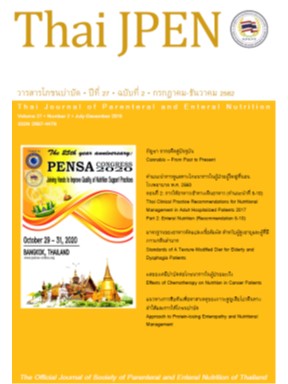ผลของเคมีบำบัดต่อโภชนาการในผู้ป่วยมะเร็ง
คำสำคัญ:
เคมีบำบัด, อาการไม่พึงประสงค์, โภชนาการ, ผู้ป่วยมะเร็งบทคัดย่อ
ผู้ป่วยมะเร็งมีความเสี่ยงสูงต่อการเกิดภาวะทุพโภชนาการ เนื่องจากผลของมะเร็งเองหรือผลไม่พึงประสงค์ของการรักษาโรคมะเร็ง โดยเฉพาะการรักษาด้วยยาเคมีบำบัดซึ่งออกฤทธิ์ทั่วร่างกายเพื่อฆ่าเซลล์มะเร็งแต่กระทบกับเซลล์ปกติของร่างกายที่มีการเจริญเติบโตเร็ว เช่น เซลล์เยื่อบุทางเดินอาหาร หรือกระตุ้นให้เกิดอาการข้างเคียงที่ส่งผลให้ผู้ป่วยรับประทานอาหารได้น้อยลงหรือร่างกายสูญเสียสารอาหารมากขึ้น เช่น เปลี่ยนแปลงการรับกลิ่นรส มีแผลในปาก เกิดอาการคลื่นไส้ อาเจียน ท้องเสีย เป็นต้น หากอาการไม่พึงประสงค์ดังกล่าวเกิดขึ้นต่อเนื่องเป็นเวลานาน ทำให้ผู้ป่วยเสี่ยงต่อการเกิดภาวะผอมหนังหุ้มกระดูกที่ส่งผลกระทบต่อคุณภาพชีวิต แพทย์อาจพิจารณาเลื่อนหรือหยุดการรักษาด้วยยาเคมีบำบัดกรณีที่ผู้ป่วยเกิดอาการไม่พึงประสงค์รุนแรง จึงทำให้รักษามะเร็งได้ไม่เต็มที่และมีอัตราการรอดชีวิตลดลง การให้คำแนะนำแก่ผู้ป่วยเฉพาะรายเกี่ยวกับยาเคมีบำบัดที่ผู้ป่วยได้รับและอาการไม่พึงประสงค์ที่อาจเกิดขึ้นก่อนได้รับการรักษาจึงเป็นสิ่งสำคัญ เพื่อเฝ้าระวังปัญหาที่อาจเกิดขึ้นและสามารถจัดการแก้ไขปัญหาทางโภชนาการได้ทันท่วงที
เอกสารอ้างอิง
Perry MC, Doll DC, Freter CE, Hejleh TA, Ailor SK, Anderson CM, et al. Perry’s The Chemotherapy Source Book. 5th ed. Philadelphia: Wolters Kluwer; 2012:38-46.
Arends J, Baracos V, Bertz H, Bozzetti F, Calder PC, Deutz NEP, et al. ESPEN expert group recommendations for action against cancer-related malnutrition. Clin Nutr. 2017;36:1187-96.
Muscaritoli M, Lucia S, Farcomeni A, Lorusso V, Saracino V, Barone C, et al. Prevalence of malnutrition in patients at first medical oncology visit: the PreMiO study. Oncotarget. 2017; 8(45):79884-96.
จินนี่ เตโชนิมิต, ณัฏฐดา อารีเปี่ยม, ทิพวรรณ ศิริเฑียรทอง, บุษบา ตระการสง่า. ภาวะโภชนาการในผู้ป่วยมะเร็งเต้านมและลำไส้ใหญ่และไส้ตรงก่อนได้รับการรักษาด้วยยาเคมีบำบัด. วารสารโรคมะเร็ง 2561;38(1):1-10.
Caro MMM, Laviano A, Pichard C. Nutritional intervention and quality of life in adult oncology patients. Clin Nutr. 2007;26:289–301.
Muscaritoli M, Molfino A, Gioia G, Laviano A, Rossi Fanelli F. The "parallel pathway": a novel nutritional and metabolic approach to cancer patients. Intern Emerg Med. 2011;6(2):105-12.
Arends J, Bachmann P, Baracos V, Barthelemy N, Bertz H, Bozzetti F, et al. ESPEN guidelines on nutrition in cancer patients. Clin Nutr. 2017;36:11-48.
de Las Peñas R, Majem M, Perez-Altozano J, Virizuela JA, Cancer E, Diz P, et al. SEOM clinical guidelines on nutrition in cancer patients (2018). Clin Transl Oncol. 2019;21(1):87-93.
แบบคัดกรองภาวะโภชนาการ สมาคมผู้ให้อาหารทางหลอดเลือดดำและทางเดินอาหารแห่งประเทศไทย (SPENT Nutrition Screening Tool) [เข้าถึงเมื่อ 2562 กันยายน 25]; [1 หน้า]. เข้าถึงได้จาก: http://www.spent.or.th/uploads/event/แบบคัดกรองภาวะโภชนาการ%20new.pdf
Komindr S, Tangsermwong T, Janepanish P. Simplified malnutrition tool for Thai patients. Asia Pac J Clin Nutr. 2013;22:516-21.
Caillet P, Liuu E, Raynaud Simon A, Bonnefoy M, Guerin O, Berrut G, et al. Association between cachexia, chemotherapy and outcomes in older cancer patients: A systematic review. Clin Nutr. 2017;36(6):1473-82.
Custódio ID, Marinho EC, Gontijo CA, Pereira TS, Paiva CE, Maia YC. Impact of chemotherapy on diet and nutritional status of women with breast cancer: A Prospective Study. PLoS One. 2016;16:11-6.
Grant BL, Hamilton KK. Medical Nutrition Therapy for Cancer Prevention, Treatment, and Recovery. In: Mahan LK, Escott-stump S, Raymond JL, editors. Krause’s Food and the Nutrition Care Process. 13th ed. PA: Elsevier Saunders; 2012:832-56.
Peterson DE, Boers-Doets CB, Bensadoun RJ, Herrsted J. Management of oral and gastrointestinal mucosal injury: ESMO Clinical Practice Guidelines for diagnosis, treatment, and follow-up. Ann Oncol. 2015;26(suppl 5):139-51.
Sultani M, Stringer AM, Bowen JM, Gibson RJ. Anti-inflammatory cytokines: important immunoregulatory factors contributing to chemotherapy-induced gastrointestinal mucositis. Chemother Res Pract. 2012;2012:490804.
Kwon Y. Mechanism-based management for mucositis: option for treating side effects without compromising the efficacy of cancer therapy. Onco Targets Ther. 2016;9:2007-16.
Lalla RV, Bowen J, Barasch A, Elting L, Epstein J, Keefe DM, et al. MASCC/ISOO clinical practice guidelines for the management of mucositis secondary to cancer therapy. Cancer 2014;120:1453–61.
Warr DG, Street JC, Carides AD. Evaluation of risk factors predictive of nausea and vomiting with current standard-of-care antiemetic treatment: analysis of phase 3 trial of aprepitant in patients receiving adriamycin-cyclophosphamide-based chemotherapy. Support Care Cancer. 2011;19:807-13
Ettinger DS, Berger MJ, Aston J, Barbour S, Bergsbaken J, Brandit D, et al. NCCN Guideline: Antiemesis version 1.2019 [cited 2019 Jun 1]. Available from: URL: https://www.nccn.org/
Gamper E-M, Zabernigg A, Wintner LM, Giesinger JM, Oberguggenberger A, Kemmler G, et al. Coming to Your Senses: Detecting Taste and Smell Alterations in Chemotherapy Patients. A Systematic Review. J Pain Symptom Manag. 2012;44(6):880-95.
Hong JH, Omur-Ozbek P, Stanek BT, Dietrich AM, Duncan SE, Lee YW, et al. Taste and odor abnormalities in cancer patients. J Support Oncol. 2009;7:58-65.
Epstein JB, Barasch A. Taste disorders in cancer patients: pathogenesis, and approach to assessment and management. Oral Oncol. 2010;46:77-81.
Steinbach S, Hummel T, Böhner C, Berktold S, Hundt W, Kriner M, et al. Qualitative and quantitative assessment of taste and smell changes in patients undergoing chemotherapy for breast Cancer or gynecologic malignancies. J Clin Oncol. 2009;27(11):1899-905.
Steinbach S, Hundt W, Schmalfeldt B, Böhner C, Berktold S, Wolf P, et al. Effect of platinum-containing chemotherapy on olfactory, gustatory, and hearing function in ovarian cancer patients. Arch Gynecol Obstet. 2012;286(2):473-80.
Rehwaldt M, Wickham R, Purl S, Tariman J, Blendowski C, Shott S et al. Self-care strategies to cope with taste changes after chemotherapy. Oncol Nurs Forum. 2009;36:E47-56.
Bossi P, Antonuzzo A, Cherny NI, Rosengarten O, Pernot S, Trippa F, et al Diarrhoea in adult cancer patients: ESMO Clinical Practice Guidelines. Ann Oncol. 2018;4:126-42.
Meta-Analysis Group In Cancer, Le´vy E, Piedbois P, Buyse M, Pignon JP, Rougier P, et al. Toxicity of fluorouracil in patients with advanced colorectal cancer: effect of administration schedule and prognostic factors. J Clin Oncol. 1998;16:3537–41.
Yumuk PF, Aydin SZ, Dane F, Gumus M, Ekenel M, Aliustaoglu M, et al. The absence of early diarrhea with atropine premedication during irinotecan therapy in metastatic colorectal patients. Int J Colorectal Dis. 2004;19:609-10.
Stein A. Chemotherapy-induced diarrhea: pathophysiology, frequency and guideline-based management. Ther Adv Med Oncol. 2010;2:51–63.
ดาวน์โหลด
เผยแพร่แล้ว
รูปแบบการอ้างอิง
ฉบับ
ประเภทบทความ
สัญญาอนุญาต
เนื้อหาและข้อมูลในบทความที่ตีพิมพ์ลงใน Thai JPEN วารสารโภชนบำบัด ถือเป็นข้อคิดเห็นและความรับผิดชอบของผู้เขียนบทความโดยตรงซึ่งกองบรรณาธิการวารสารไม่จำเป็นต้องเห็นด้วยหรือร่วมรับผิดชอบใด ๆ
บทความ ข้อมูล เนื้อหา รูปภาพ ฯลฯ ที่ได้รับการตีพิมพ์ใน Thai JPEN วารสารโภชนบำบัด ถือเป็นลิขสิทธิ์ของ Thai JPEN วารสารโภชนบำบัด หากบุคคลหรืหน่วยงานใดต้องการนำทั้งหมดหรือส่วนใดส่วนหนึ่งไปเผยแพร่หรือเพื่อกระทำการใด จะต้องได้รับอนุญาตเป็นลายลักษณ์อักษรจาก Thai JPEN วารสารโภชนบำบัด ก่อนเท่านั้น



